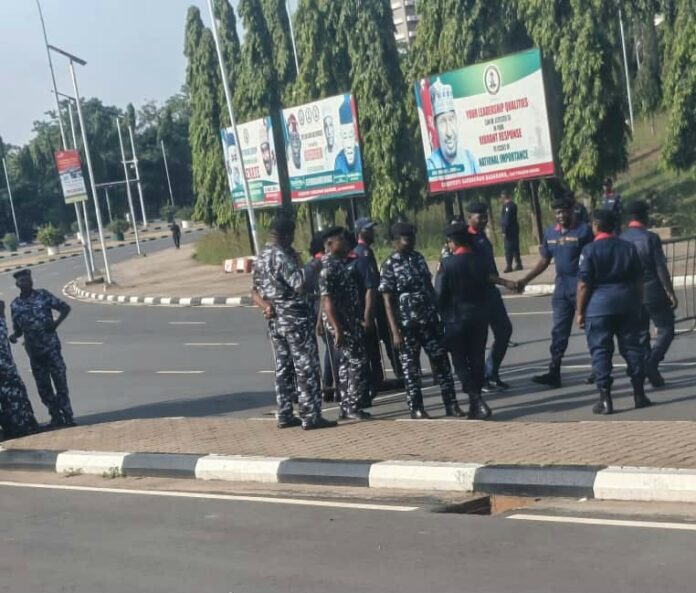Abuja, June 12 — On Thursday morning, security operatives blocked the main entrance to Nigeria’s National Assembly complex in Abuja, stopping a group of peaceful protesters from entering the premises. The protest was organized by the Take It Back Movement alongside several civil society groups as part of activities to mark June 12, Nigeria’s Democracy Day.
Why Were People Protesting?
The demonstrators came out to express their frustration over what they call “two years of misrule, hardship, and insecurity” under President Bola Ahmed Tinubu’s administration. According to the protesters, many Nigerians are suffering from high prices, unemployment, and growing insecurity, and they believe the government is not doing enough to address these issues.
The protest was originally planned to hold at Eagle Square, a common venue for national events. However, the organizers later shifted the location to the National Assembly, where President Tinubu was expected to give a speech to lawmakers in celebration of Democracy Day.
Juwon Sanyaolu, the National Coordinator of the Take It Back Movement, explained that changing the venue didn’t mean changing the message.
“Even though we earlier announced Eagle Square as our venue, Nigerians have every right to gather at the National Assembly,” he said. “People are suffering. There’s hunger, joblessness, and insecurity everywhere. This protest is about standing up and demanding better leadership.”
What Happened at the National Assembly?
When protesters and journalists arrived at the National Assembly, they were met by a strong show of force. Security officers from the Nigeria Security and Civil Defence Corps, as well as heavily armed police officers, were stationed at the main gate. Iron barricades and a large truck were placed across the entrance to block access.
No major clashes were reported, but the heavy security presence sent a clear message: the government was not willing to allow the protesters near the premises during the president’s visit.
What’s the Bigger Picture?
June 12 is marked as Democracy Day in Nigeria to remember the country’s struggle for democratic rule. But for many Nigerians, especially young people, the celebration feels incomplete when basic rights like freedom of expression and peaceful protest are restricted.
This incident is part of a larger pattern. In recent years, peaceful protests in Nigeria — from #EndSARS to economic rallies — have often been met with police crackdowns or government pushback. Many young Nigerians feel silenced or ignored, even as they face rising costs of living and lack of opportunities. This moment reflects a growing question: Can the voices of the youth be heard in Nigeria’s democracy?
As one young protester said off-camera, “We just want to be seen and heard. This is our future too.”



